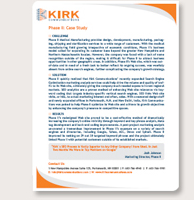![]()
![]()
![]()
Introduction
Welcome to the September edition of the Kirk Communications quarterly newsletter. We´ve chosen to focus on an important topic that gets a lot of well-meaning marketing professionals into really bad search engine optimization (SEO) trouble and we want to be sure it doesn't happen to you.
Don't Risk Getting Blacklisted!
USE SUCCESSFUL BACK LINK STRATEGIES
Search engines like Google have achieved success for one overriding reason: they deliver relevant results. You can be certain that they continue to focus their enormous resources on ensuring that it is easy for users to get the information they're looking for. That means any "scheme" that tries to manipulate search results will eventually fail. You may have heard of link schemes that unscrupulous SEO companies and webmasters swear will bring you heavenly rankings. Sure, you may briefly soar to the organic ranking stratosphere, but it won't be long until you crash and burn. Here's how it works.
Back Links Can Help or Hurt Your Organic Ranking
To be sure you're clear on what a "back link" is, here's a short description. When your SEO-optimized content is published online, it will contain keywords that are tagged with URL links to pages on your website. The publishers of quality websites have to make the editorial decision to enable back links, so they make a careful evaluation to be sure your content is relevant to their site.
Developing back links with a number of quality, relevant sites will improve your organic ranking.
In fact, proper back-linking is one of the most effective-SEO tools. The sites that link to you can provide context about your subject matter and reflect the quality and popularity of your site. The more relevant content you have published online, the more SEO success you'll have. Keep in mind, however, that you need to be published on quality sites where your content would legitimately appear.
Using link exchange schemes that focus on quantity while disregarding quality and relevance will hurt your SEO ranking.
Some SEO companies and webmasters engage in link exchange schemes and build partner pages exclusively for the sake of cross-linking. They ignore the quality of the links, the sources and the long-term impact it will have on their sites. This is in violation of Google's webmaster guidelines and will negatively impact your site's ranking in search results. Examples of link schemes you should avoid include:
- Links intended to manipulate PageRank
- Links to web spammers or bad neighborhoods on the web
- Excessive reciprocal links or excessive link exchanging ("Link to me and I'll link to you.")
- Buying or selling links that pass page rank
Develop Unique, Relevant Content to Improve SEO, Build Your Brand and Create Demand
Integrating SEO-optimized content into all your communications is a simple, cost-effective way to improve your organic ranking, build your brand and create demand. You'll be developing content just once, and then disseminating it in a variety of channels. You'll reach more of your target audience with a consistent message that will be reinforced in many of the sites they normally visit.
We hope you've found this information helpful. At Kirk Communications, we are focused on driving traffic to your site through ethical processes that we've proven to be successful - and that will preserve your reputation. By integrating services that include interactive marketing, strategic/tactical communications, public relations, website development, SEO, SEM and e-marketing, we're a partner you can count on to help build your business.
To get your FREE comprehensive SEO analysis of your site please click here.
![]()
![]()
![]()

![]() We´ll identify steps to
We´ll identify steps to
![]() improve your ranking.
improve your ranking.
![]()
![]()
![]()
![]()
![]()

Read how Kirk helps Phase II Medical Manufacturing to drive the volume and quality of traffic to its Web site






